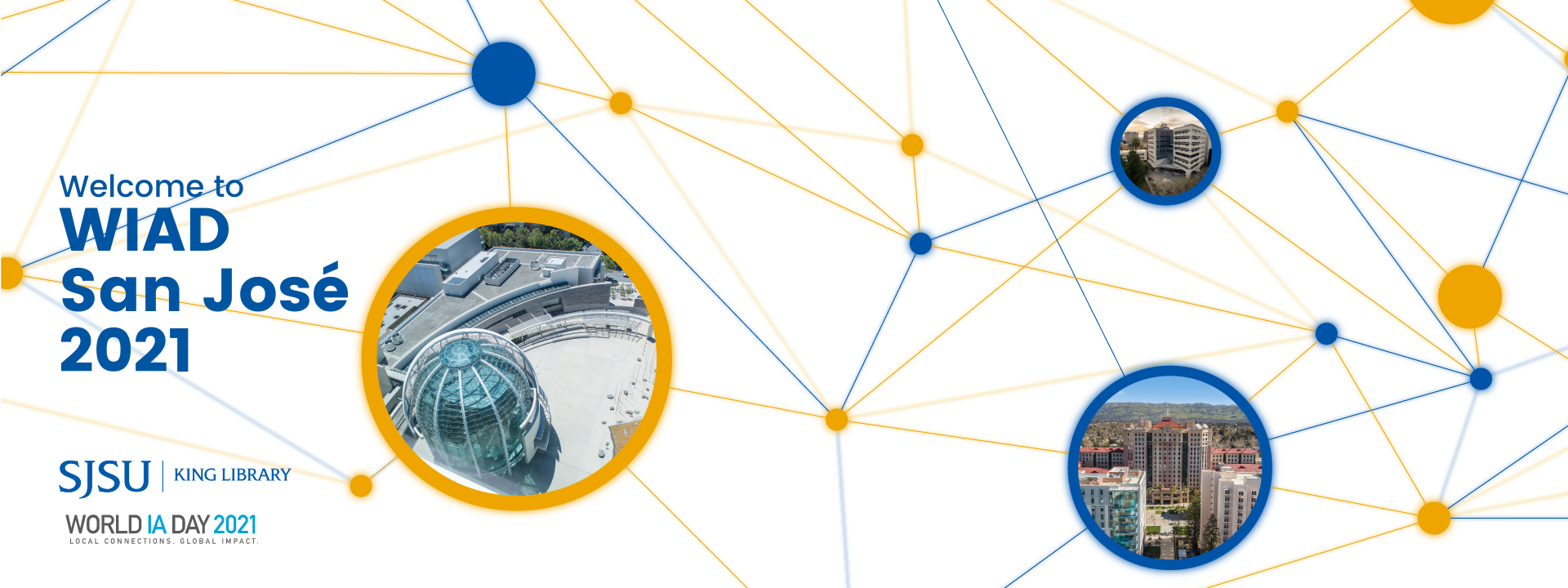
San José State University King Library invites you to join us on February 27, 2021 for the first-ever online World Information Architecture Day in San José, California. All are welcome to attend!
Please bookmark this page and check back soon for updates. We look forward to seeing you!
Questions? Please contact us at sanjose.ca@worldiaday.org.
Program/Schedule
Please note, all sessions are taking place Pacific Standard Time.
9:45-10 a.m. Welcome Remarks
Outreach and User Engagement Librarian, SJSU King Library
"Applying user-centered design to create Stanford Library's Systemic Racism Tracker"
UX Designer, Stanford Library
After the murder of George Floyd in May 2020, Stanford Library staff were eager to take action to combat systemic racism. Hundreds of ideas were generated from across the library, but a clear and focused direction was needed to procure funding and start development. We also wanted to ensure that anything we created would result in actionable and positive change in the community. Along with the Head of Learning and Outreach and the Sociology Subject Specialist, I applied user-centered design to shape the experience into what we now refer to as the Systemic Racism Tracker.
"Archiving Experiences with VR"
Technology Labs Coordinator, San José State University King Library
The COVID-19 pandemic presents us with many challenges but one which struck me was how to present traditionally in-person experiences virtually. One of the challenges was showcasing our exhibits. SJSU King Library experimented with several online platforms including Mozilla Hubs, Amazon Sumerian, and technologies such as photogrammetry and laser scanning to capture experiences and share them online. In this presentation, I will share a brief overview of tools and samples to get you started in archiving your experiences.
"Kingbot IA: Organizing and Adapting Content for a Library Chatbot"
User Experience Librarian, San José State University
Kingbot is SJSU King Library’s After Hours Chatbot. Chatbots are intelligent conversational software that respond to humans via text or voice commands. Kingbot is automatically activated after human-facilitated chat reference hours are over and provides circulation and basic reference information to SJSU King Library patrons. It also provides helpful links to LibGuides or resources where patrons find more information regarding patron inquiries.
See how the SJSU King Library organized and adapted content for their chatbot using existing resources and question suggestions from reference analytics, LibAnswer FAQs, the library website, and discussions with library faculty and staff. Attendees will understand chatbot content best practices and how to use available content and data to populate chatbot interactions. This short talk will also cover the information architecture involved in deciding the chatbot interface, and the interactive elements needed to provide a positive user experience for SJSU patrons.
"From librarian to information architect: Transformative traits and curious questions"
Assistant Professor, San José State University
Taking on the role of information architect when grounded in rich experiences as a librarian involves much more than learning about IA best practices, content strategy, and tools for user research, prototyping, and design documentation. The transition also leads to reshaping one’s professional identity in ways that help both to discover and develop transformative traits. Unwavering curiosity, flexibility, the ability to frame potent questions, and to integrate requirements and structures are among the most prominent—and persistent—attributes. This talk will highlight findings from a current study of professional identity shifts in academic and public librarians who have moved into IA responsibilities, and among those who have left library environments to work as IAs for non-profits and businesses.
"Make Your Own Smart Home Device"
Graduate Student Assistant, San José State University
This session will serve as an Internet of Things (IoT) 101 covering how to build your own smart home device.
"Introduction to Internet of Things: Architecture and Components"
Graduate Student Assistant, San José State University
What is the Internet of Things? What the IoT buzz is all about? How does IoT work? The talk is going to answer all these questions along with the discussions of examples. We will briefly cover the IoT architecture, its components, the dataflow in IoT with system examples. We will also look into how one can start developing IoT systems in terms of hardware and software components.
12-12:50 p.m. LUNCH
Panel Presentation: SJSU Beethoven Center's Mozilla Hubs Exhibit
Erica Buurman
Ira F. Brilliant Center for Beethoven Studies, San José State University
Tyler Stannard
San José State University
Liv Erickson
Product Manager, Mozilla Hubs
Moderated by Jon Oakes
See how Mozilla Hubs helped us recreate the Beethoven Center for Beethoven's 250th birthday and how it allowed music students, historians and artists come together although miles apart.
"BayAreaCommunity.org"
Anthony Chen, Data Lead at Code for San José & Charlie Hoffs, Co-founder of unBox, Stanford Undergraduate in Chemical Engineering, 2022
BayAreaCommunity.org is an up-to-date, mobile-friendly, multilingual website helping local residents seeking resources access reliable information. CFSJ's technical expertise helps power our back-end!
"The All-In-One Map"
Project Lead, Code for San José
OpenStreetMap is the Internet’s most ambitious world map, built by people like you. Its data powers navigation to augmented reality to news, all together in a single database. You can be part of it!
"Using a Design Audit to Improve User Experience"
UX/UI Designers, Code for San José
A showcase of how we conducted a design audit to improve the overall user experience and information architecture of the healthcare.gov website.
"Back to Basics: DADA or Daily Advocacy for Digital & Analog"
Discovery & Systems Librarian, California State University, Dominguez Hills
We are so used to working in the digital world that it is hard to imagine learning anything from the analog world. Let's discuss how derive our current understanding of IA from non-digital origins.



















